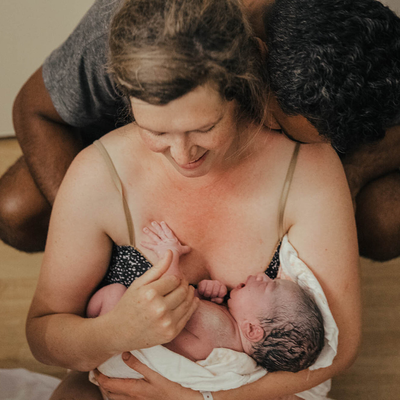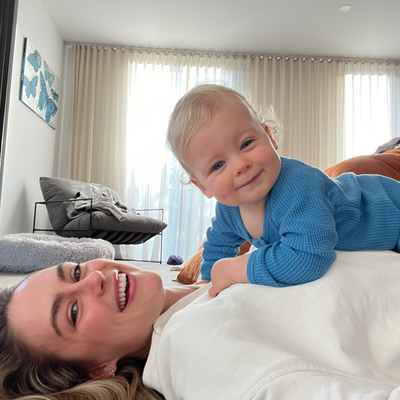
While the ‘baby blues’ used to describe that first week-ish of parenthood is almost inevitable, postnatal depression is a completely separate worry. It is common - affecting 1 in 5 mums and 1 in 10 dads Australia wide* - but it is not normal. The symptoms and experiences are much more challenging, and it’s a long and windy road if you choose to confront this illness alone.
Model, content creator, and mum-of-two, Tahlia Giumelli, harnessed the connection of her online community during some very dark times after her second pregnancy, and continues to lift the veil on topics of motherhood that many still deem taboo.
Here’s what Tahlia had to say when we asked her about motherhood (messy bits included)...
Go on Tahls, give us your personal elevator pitch!
Hi, my name’s Tahlia. I also respond to mum, mummy or MUMMMMMM! I’ve been a model for the last 12 years and have more recently moved into brand partnerships and content creation. I have two daughters, Sophie (3) and Elodie (2), and our pup Ted. I share all this chaos with my husband, Thomas Burgess.
Was motherhood always on the cards for you?
I had always thought of motherhood as something I would love to welcome into my life, but hadn’t really thought about it in detail. It’s no secret Sophie was our happy surprise and what a beautiful surprise she was! We knew straight away that adding to our family was a no brainer, and now we have our Elodie who has absolutely made us complete.
How did you lean on your social community during some of the pricklier times? Illness, loneliness, everything in between...
Being transparent can be hard, especially on social media. You only see little snippets of someone’s life and I have always said I want to be honest with everyone, because social media can really glamorise life. The reality is that between the cute, posed pictures of the girls smiling, there are times when you are struggling or having a bad day with the kids. Opening up and creating a community has helped me in some of the lonelier times, connecting with mums awake with newborns at the same ungodly hour as me, or even making and talking with friends on the other side of the world. Sharing experiences, providing support, and making motherhood seem a little less lonely. There have been mums, friends or strangers that have come to my help when I’ve needed it without any questions asked. It takes a village to raise a child and I’m so thankful for everyone who has been there.
Can you describe your experience with postnatal depression for those who might be quietly suffering?
I was diagnosed with postnatal depression when Elodie was 6 weeks old. After already having had Sophie, I knew what I was experiencing was different to the baby blues. I knew something wasn’t quite right with how I was feeling and brought it up with my husband and friends. Once I had spoken up and knew that there were people who could support me, I booked in with my GP to talk next steps and getting the help I needed. It was the best thing I could have done at the time.
PND only reared its ugly head with your second pregnancy. Looking back, why do you think that is?
My experiences with each child were so vastly different. With Sophie, I had the time to get to know her, to recover, and go through the emotions. I had time to work it all out and bond with her one on one. With Elodie we had a lot of things going on all at once. She arrived quite suddenly at 36 weeks, and then at 4 days old Sophie and I contracted a vomiting bug which put us all back in hospital. We struggled to establish breastfeeding and then at 4 weeks old she was in hospital for a week with bronchitis which she picked up from Sophie. On top of that, we had to move out of our current house while trying to find our forever home.
Looking back on it now, I can see we just had so much going on in our lives, compared to when we had Sophie, and eventually it all just got too much for me to handle.
Baby blues and PND are two different things, how did you navigate your emotions during the fourth trimester and beyond?
Postnatal depression is so much harder to describe. You ‘should’ be feeling happy because you’ve welcomed this sweet baby into your life, but your emotions say otherwise which then makes you feel guilty as a mum. You’re not ungrateful but you’re not happy, and you don’t know why. It's honestly such a mixed bag of thoughts and feelings.
When I went through this and started getting help from my GP, I finally reached out to friends. Catching up with them for a dinner or a painting class and doing something on my own allowed me to remember who I was before I became a mum. We were/are so lucky to have a strong family support network, which I don’t take for granted. This allowed Tom and I to go out for date nights just the two of us and those little things really helped. Going to the gym, going back to work, going for a walk with the dog, doing something for myself, by myself was the time I needed to heal. Doing what you loved doing before you had kids if you can is a great way to stop, think and reflect. I loved coming home to my family after those moments alone.
For new and expecting mums, what’s one piece of advice you wish you knew before welcoming two tiny (beautiful!) humans into the world?
There will be days when you think you’re absolutely nailing it and days where you wonder what the hell went wrong, but every day is a new day. Children don’t come with instruction manuals; everyone is making it up as they go (despite what it might look like on Instagram!) and however you decide to raise your family is the right way. They say you blink and it’s over, but when you are in the trenches of newborn life it doesn’t feel like it will ever end! Then, as they get older you reflect on those years prior and it really does go by so fast. It’s so important just to appreciate every second.
It can be hard to know if what you’re feeling is normal, or the start of something more serious. If unsure, it’s always a good idea to seek professional help. Symptoms too, can often be misinterpreted as an adjustment to caring for your newborn ie. sleeping too much or too little, loss of appetite, difficulty coping with day-to-day activities or errands, thoughts of harming yourself or your child.
Your doctor or nurse can provide advice and guide you in whatever treatment will work best for you, whether that be calling on your support network for greater assistance, counselling, or prescribed medication.
If you are having thoughts of self-harm or suicide, call Lifeline on 13 11 14 for immediate support.
*Health Direct, Postnatal Depression, July 2022




Comments